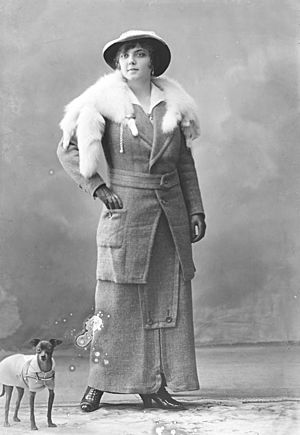Conchita Supervía facts for kids
Conchita Supervía (born December 8 or 9, 1895 – died March 30, 1936) was a very popular Spanish singer. She was a mezzo-soprano, which means she had a middle-range female voice. Conchita performed in operas and gave concerts in Europe and America.
Contents
Early Life
Conchita Supervía was born in Barcelona, Spain. Her full name was María de la Concepción Supervía Pascual. She went to a local convent school. When she was just 12 years old, she started studying singing at the Conservatori Superior de Música del Liceu in Barcelona.
Amazing Career
First Steps
Conchita made her first stage appearance in 1910 when she was only 15. This was at the Teatro Colón in Buenos Aires, Argentina. She sang in an opera called Blanca de Beaulieu. After that, she performed in Los Amantes de Teruel and as Lola in Cavalleria rusticana.
In 1911, she sang the role of Octavian in the first Italian version of Der Rosenkavalier in Rome. A year later, in 1912, she played Carmen at the Gran Teatre del Liceu in her hometown. This role became very famous for her throughout her career.
Becoming Famous
Conchita first performed in America in 1915. She sang as Charlotte in Werther at the Chicago Opera. She also performed in Mignon and Carmen there. After World War I, she returned to Europe. In Rome, she helped bring back the music of Gioachino Rossini. She became world-famous for her roles as Angelina in La Cenerentola, Isabella in L'italiana in Algeri, and Rosina in Il barbiere di Siviglia. She sang these roles in their original musical keys.
Her Recordings and Life in London
Conchita Supervía made over 200 recordings. Most of these were for Fonotipia and Odeon. Her recordings included her famous opera roles. She also sang many songs in different languages like Catalan, Spanish, French, Italian, and English. She even recorded songs from zarzuela (Spanish musical plays) and operetta (light operas).
In 1930, she performed in London for the first time at the Queen's Hall. The next year, she married Ben Rubenstein, a businessman from London, and they lived there. She already had a teenage son named Giorgio.
Her first performance at the Covent Garden in London was in 1934 in La Cenerentola. In 1935, she sang that part again, along with L'Italiana in Algeri and Carmen. In 1934, Conchita also appeared in a British movie called Evensong. She played a singer named Baba L'Etoile.
Her Special Voice
Conchita Supervía had a very strong lower voice. It could easily connect with her flexible upper voice, which was great for fast, fancy musical parts. She was also a very unique and exciting musician. Some people noticed a strong vibrato in her voice, especially in the lower notes. A vibrato is a slight, quick change in pitch that makes a sound richer.
Many people who heard her live said that this vibrato was more noticeable on recordings than when she sang on stage. This can happen because microphones sometimes make a singer's small vocal quirks sound bigger. In the 1920s, Supervía sang at La Scala as Hänsel in Hänsel und Gretel. However, it's interesting that she never sang her famous Rossini roles or Carmen at La Scala, even though she performed there every season until 1929.
Her Passing
Conchita had to cancel her performances in late 1935 because she was pregnant. On March 29, 1936, she went to a clinic in London. Her baby was born on March 30, but sadly, it did not survive. A few hours later, Conchita herself passed away. She was buried with her baby daughter in the Liberal Jewish Cemetery in Willesden, northwest London. The grave was designed by Edwin Lutyens. In 2006, a group of her fans helped fix up the grave, and it was blessed again.
See also
 In Spanish: Conchita Supervía para niños
In Spanish: Conchita Supervía para niños
 | William L. Dawson |
 | W. E. B. Du Bois |
 | Harry Belafonte |


